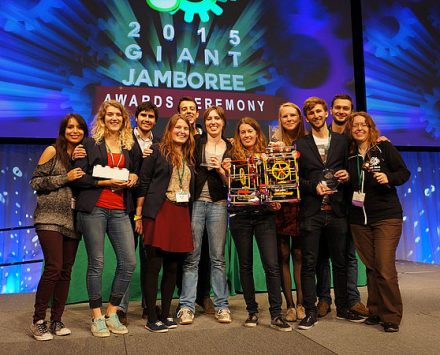
TU Delft students scooped up prizes galore at the International Genetically Engineered Machine (iGEM) competition in Boston. With their project, ‘Biolinker’, a 3D printer built out of K’NEX that can print layers of bacteria, they won the overall prize, making them the best team in the world. They also won three other prizes: best hardware project, best wiki (website), and best applied design.
The iGEM competition is an annual worldwide student competition in the field of synthetic biology. This year, the TU Delft iGEM focused its efforts on the 3D printing of biofilms – thin layers of bacteria. In simple terms, the team inserts the bacteria into a printer (made out of K’NEX), which then prints out the bacteria in neat layers. The resulting biofilms can then serve as a test platform for research in industrial and medical applications.
Biofilms
The greatest challenge facing the team from Delft was to print biofilms quickly and inexpensively, and in a reproducible manner. Bacteria, algae, and moulds produce these biofilms naturally. They consist of layers of micro-organisms that live in clusters, in much the same way as plaque on teeth. In a biofilm, these harmful micro-organisms have extra protection, against antibiotics, for example. The layers can therefore render antibiotics (or other substances) ineffective. Moreover, biofilms are very hard to remove. That is why there is a great deal of scientific and commercial interest in biofilms (and in combating them), in relation to medical implants, for example.
The TU Delft team has designed bacteria that can link up by means of so-called nanowires (very thin ‘threads’), which is necessary in order to make a ‘good’ biofilm. The biofilms are then produced using a 3D printer containing these bacteria. This way, an inexpensive and automated standard method is created for the production of these biofilms.
iGEM
After months of preparation, the TU Delft team took part in the iGEM competition in Boston, from 24 to 28 September. iGEM is the largest student competition in the field of synthetic biology. This year, 259 teams from all over the world entered the competition. The team of eight students from TU Delft and one student from The Rotterdam University of Applied Sciences won the overall prize, making the team the best in the world. They also won three other prizes: best hardware project, best wiki (website), and best applied design. In addition, they were nominated for best model, best integrated human practice, best composite part, and best part collection. The team advisor, who assessed a number of other teams, was also awarded a prize – she was voted the best jury member.
This project was supported by the BE-Basic Foundation Educational Programme.
More information
• Film about iGEM TU Delft Biolinker project
• iGEM 2015 competition website
• TU Delft iGEM team website
• Team iGEM TU Delft on Facebook
• Team iGEM TU Delft on Twitter: @TUDelft_iGEM

